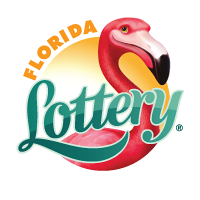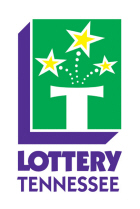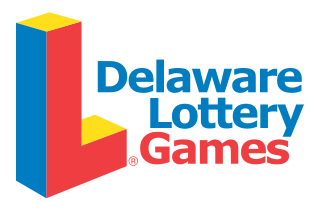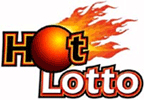
Mega Millions is an American multi-jurisdictional lottery game; as of January 30, 2020, it is offered in 45 states, the District of Columbia, and the U.S. Virgin Islands. The first (The Big Game) Mega Millions drawing was in 2002; see below. What is now Mega Millions initially was offered in six states; the logo for all versions of the game following the retirement of The Big Game name featured a gold-colored ball with six stars to represent the game's initial membership, although some lotteries insert their respective logo in the ball.
Powerball is an American lottery game offered by 45 states, the District of Columbia, Puerto Rico and the U.S. Virgin Islands. It is coordinated by the Multi-State Lottery Association (MUSL). From its inaugural drawing on April 19, 1992, until August 21, 2021, Powerball drawings were held twice a week ; a third weekly drawing was added on August 23, 2021. Drawings are held every Monday, Wednesday and Saturday evening at 10:59 p.m. Eastern Time, at Florida Lottery headquarters in Tallahassee.

The Georgia Lottery Corporation, known as the Georgia Lottery, is overseen by the government of Georgia, United States. Headquartered in Atlanta, the lottery takes in over US$1 billion yearly. By law, half of the money goes to prizes, one-third to education, and the remainder to operating and marketing the lottery. The education money funds the HOPE Scholarship, and has become a successful model for other lotteries, including the South Carolina Education Lottery.

The Florida Lottery is the government-operated lottery of the U.S. state of Florida. As of 2022, the lottery offers eleven terminal-generated games: Cash4Life, Mega Millions, Powerball, Florida Lotto, Pick 2, Pick 3, Pick 4, Pick 5, Fantasy 5, Cash Pop, and Jackpot Triple Play.

The Multi-State Lottery Association (MUSL) is an American non-profit, government-benefit association owned and operated by agreement of its 34 member lotteries. MUSL was created to facilitate the operation of multi-jurisdictional lottery games, most notably Powerball.
The Oklahoma Lottery is an American lottery that is operated by that state's government. The Lottery, which began ticket sales on October 12, 2005, is a member of the Multi-State Lottery Association (MUSL).
The Iowa Lottery Authority is run by the state of Iowa. It is a member of the Multi-State Lottery Association (MUSL), which administers games on behalf of the member lotteries. The Iowa Lottery portfolio includes Powerball, Mega Millions, Lotto America, Lucky for Life, Pick 3, Pick 4, plus numerous instant scratch ticket, InstaPlay and pull-tab games.
The Maine Lottery is run by the government of Maine. It is a member of the Multi-State Lottery Association (MUSL), whose flagship game is Powerball. It was founded in 1974 after being approved through a voter referendum.
The New Mexico Lottery is run by the government of New Mexico. It was established in 1996. It is a member of the Multi-State Lottery Association (MUSL). It offers draw games and scratch off games. As of December 2014, draw games are Powerball, Mega Millions, Monopoly Millionaires' Club, Hot Lotto, Roadrunner Cash, Pick 3, Quicksters, and Lucky Numbers Bingo.
The North Dakota Lottery is run by the government of North Dakota. The Lottery began in 2004, following voter approval of an initiative constitutional amendment in 2002, Measure 2, which amended Article XI, Section 25 of the North Dakota Constitution to allow for the state to join a multi-state lottery "for the benefit of the State of North Dakota." In-state games were not allowed; 63 percent of voters supported the measure.
The South Dakota Lottery is run by the government of South Dakota. It is a member of the Multi-State Lottery Association (MUSL). The Lottery is headquartered in Pierre; it is a self-funded endeavor. The minimum age to buy tickets is 18; however, video lottery players must be at least 21.
The West Virginia Lottery is run by the government of West Virginia. It was established in 1984 via a voter referendum. It is a charter member of the Multi-State Lottery Association (MUSL). The Lottery offers games such as Lotto America, Powerball, Mega Millions, and scratch tickets. West Virginia has reinterpreted the amendment to its Constitution that permitted its lottery to include casinos, and thus the West Virginia Lottery Commission also regulates slot machines, which are marketed as "video lottery" and available at several hundred businesses; and five "lottery table games" casinos.

The Connecticut Lottery Corporation, also called the CT Lottery, is the official lottery in Connecticut. It was created in 1971 by then-Gov. Thomas Meskill, who signed Public Act No. 865. The first tickets were sold on February 15, 1972. The Connecticut Lottery offers several in-house drawing games; Connecticut also participates in Mega Millions and Powerball; each are played in 44 states, the District of Columbia, and the U.S. Virgin Islands.

The Tennessee Lottery is run by the Tennessee Education Lottery Corporation (TELC), which was created on June 11, 2003, by the Tennessee General Assembly. TELC derives its legal authority from the Tennessee Education Lottery Implementation Law, which the General Assembly passed in accordance with a November 2002 amendment to the state constitution establishing the lottery and approved by 58 percent of the voters.

The Delaware Lottery is run by the government of Delaware. Its creation was authorized by the state legislature on May 31, 1974. Its "traditional" games include Play 3, Play 4, Multi-Win Lotto, Lucky For Life, Lotto America, Mega Millions, and Powerball. Delaware also offers Keno, sports betting, and video lottery.

The Colorado Lottery is run by the state government of Colorado. It is a member of the Multi-State Lottery Association(MUSL).

Lotto America is an American multi-state lottery game that began in 2017. It is operated by the Multi-State Lottery Association (MUSL). It takes its name from the original Lotto America, offered from 1988 to 1992. Lotto America was re-launched by 13 state lotteries on November 12, 2017, as a replacement for the scandal-tarred Hot Lotto game; each of the 13 members of Lotto America offered Hot Lotto when it ended on October 28, 2017.
The Vermont Lottery began fiscal operations as an enterprise fund in October 1977, following a 1976 referendum, and the enactment of Public Act No. 82 by the 1977 General Assembly. It is run by the Vermont Lottery Commission, which is headquartered in Berlin. Along with Maine and New Hampshire, Vermont is a member of the Tri-State Lottery.

Lottery fraud is any act committed to defraud a lottery game. A perpetrator attempts to win a jackpot prize through fraudulent means. The aim is to defraud the organisation running the lottery of money, or in the case of a stolen lottery ticket, to defraud an individual of their legitimately won prize.
The Hot Lotto fraud scandal was a lottery-rigging scandal in the United States. It came to light in 2017, after Eddie Raymond Tipton, the former information security director of the Multi-State Lottery Association (MUSL), confessed to rigging a random number generator that he and two others used in multiple cases of fraud against state lotteries. Tipton was first convicted in October 2015 of rigging a $14.3 million drawing of MUSL's lottery game Hot Lotto. Eddie Tipton ultimately confessed to rigging lottery drawings in Iowa, Colorado, Wisconsin, Kansas and Oklahoma. Also involved in the scheme were his brother and former Texas justice of the peace Tommy Tipton and Texas businessman Robert Rhodes. Eddie Tipton was sentenced to 25 years in prison.









